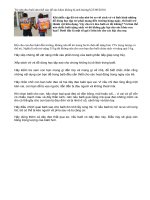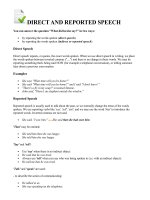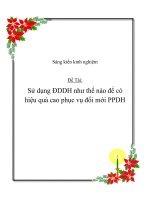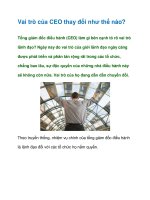Reported Speech_Xem để thấy hay như thế nào
Bạn đang xem bản rút gọn của tài liệu. Xem và tải ngay bản đầy đủ của tài liệu tại đây (135.72 KB, 9 trang )
DIRECT AND REPORTED SPEECH
You can answer the question "What did he/she say?" in two ways:
• by repeating the words spoken (direct speech)
• by reporting the words spoken (indirect or reported speech).
Direct Speech
Direct speech repeats, or quotes, the exact words spoken. When we use direct speech in writing, we place
the words spoken between inverted commas ("....") and there is no change in these words. We may be
reporting something that's being said NOW (for example a telephone conversation), or telling someone
later about a previous conversation
Examples
• She says "What time will you be home?"
• She said "What time will you be home?" and I said "I don't know! "
• "There's a fly in my soup!" screamed Simone.
• John said, "There's an elephant outside the window."
Reported Speech
Reported speech is usually used to talk about the past, so we normally change the tense of the words
spoken. We use reporting verbs like 'say', 'tell', 'ask', and we may use the word 'that' to introduce the
reported words. Inverted commas are not used.
• She said, "I saw him." She said that she had seen him.
'That' may be omitted:
• She told him that she was happy.
• She told him she was happy.
'Say' and 'tell':
• Use 'say' when there is no indirect object:
• He said that he was tired.
• Always use 'tell' when you say who was being spoken to (i.e. with an indirect object):
• He told me that he was tired.
'Talk' and 'speak' are used:
- to describe the action of communicating:
• He talked to us.
• She was speaking on the telephone.
- with 'about' to refer to what was said:
• He talked (to us) about his parents.
REPORTED SPEECH
Tense Changes When Using Reported Speech
Normally, the tense in reported speech is one tense back in time from the tense in direct speech:
She said, "I am tired." She said that she was tired.
The changes are shown below:
Simple present Simple past
"I always drink coffee", she said
She said that she always drank coffee.
Present continuous Past continuous
"I am reading a book", he explained.
He explained that he was reading a book
Simple past Past perfect
"Bill arrived on Saturday", he said.
He said that Bill had arrived on Saturday
Present perfect Past perfect
"I have been to Spain", he told me.
He told me that he had been to Spain
Past perfect Past perfect
"I had just turned out the light," he
explained.
He explained that he had just turned out the
light.
Present perfect continuous Past perfect continuous
They complained, "We have been waiting
for hours".
They complained that they had been waiting
for hours.
Past continuous Past perfect continuous
"We were living in Paris", they told me.
They told me that they had been living in
Paris.
Future Present conditional
"I will be in Geneva on Monday", he said
He said that he would be in Geneva on
Monday.
Future continuous Conditional continuous
She said, "I'll be using the car next Friday".
She said that she would be using the car next
Friday.
NOTE:
1. You do not need to change the tense if the reporting verb is in the present, or if the original statement
was about something that is still true, e.g.
• He says he has missed the train but he'll catch the next one.
• We explained that it is very difficult to find our house.
2. These modal verbs do not change in reported speech:
might, could, would, should, ought to, e.g.
• We explained that it could be difficult to find our house.
• She said that she might bring a friend to the party.
REPORTED SPEECH: CHANGE OF
TIME AND PLACE
Time/place references change when using reported speech
Example
• "I will see you here tomorrow", she said. She said that she would see me there the next day.
The most common of these changes are shown below:
Today that day
"I saw him today", she said.
She said that she had seen him that day.
Yesterday the day before
"I saw him yesterday", she said.
She said that she had seen him the day
before.
The day before yesterday two days before
"I met her the day before yesterday", he said.
He said that he had met her two days before.
Tomorrow the next/following day
"I'll see you tomorrow", he said
He said that he would see me the next day.
The day after tomorrow in two days time/ two days later
"We'll come the day after tomorrow", they
said.
They said that they would come in two days
time/ two days later.
Next week/month/year the following week/month/year
"I have an appointment next week", she said.
She said that she had an appointment the
following week.
Last week/month/year the previous/week/month/year
"I was on holiday last week", he told us.
He told us that he had been on holiday the
previous week.
ago before
"I saw her a week ago," he said.
He said he had seen her a week before.
this (for time) that
"I'm getting a new car this week", she said.
She said she was getting a new car that week.
this/that (adjectives) the
"Do you like this shirt?" he asked
He asked if I liked the shirt.
here there
He said, "I live here".
He told me he lived there.
Other changes:
In general, personal pronouns change to the third person singular or plural, except when the speaker
reports his own words:
• I/me/my/mine, you/your/yours him/his/her/hers
• we/us/our/ours, you/your/yours they/their/theirs:
• He said: "I like your new car." He told her that he liked her new car.
• I said: "I'm going to my friend's house." I said that I was going to my friend's house.
Question Forms and Reported Speech
Question Forms and Reported Speech
1. Normal word order is used in reported questions, that is, the subject comes before the verb, and it is
not necessary to use 'do' or 'did':
• "Where does Peter live?" She asked him where Peter lived.
2. Yes / no questions: This type of question is reported by using 'ask' + 'if / whether + clause:
• "Do you speak English?" He asked me if I spoke English.
• "Are you British or American?" He asked me whether I was British or American.
• "Is it raining?" She asked if it was raining.
• "Have you got a computer?" He wanted to know whether I had a computer.
• "Can you type?" She asked if I could type.
• "Did you come by train?" He enquired whether I had come by train.
• "Have you been to Bristol before?" She asked if I had been to Bristol before.
3. Question words:
This type of question is reported by using 'ask' (or another verb like 'ask') + question word + clause. The
clause contains the question, in normal word order and with the necessary tense change.
• "What is your name?" he asked me. He asked me what my name was.
• "How old is your mother?", he asked. He asked how old her mother was.
• The policman said to the boy, "Where do you live?" The policeman asked the boy where he
lived.
• "What time does the train arrive?" she asked. She asked what time the train arrived.
• "When can we have dinner?" she asked. She asked when they could have dinner.
• Peter said to John, "Why are you so late?" Peter asked the John why he was so late.
Note: See also Summary of Reporting Verbs
Reported Speech: orders, requests &
suggestions
ORDERS, REQUESTS, SUGGESTIONS
1. When we want to report an order or request, we can use a verb like 'tell' with a to-clause.
Example
• He told me to go away.
The pattern is verb + indirect object + to-clause.
(The indirect object is the person spoken to.)









